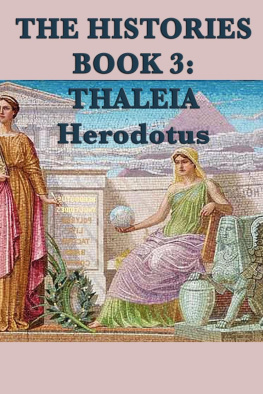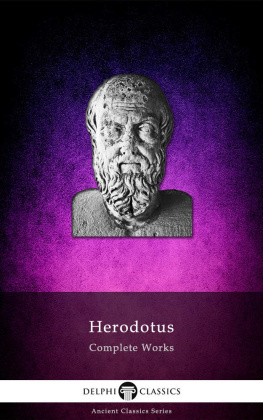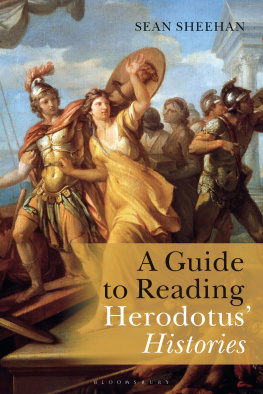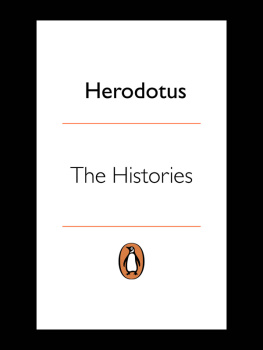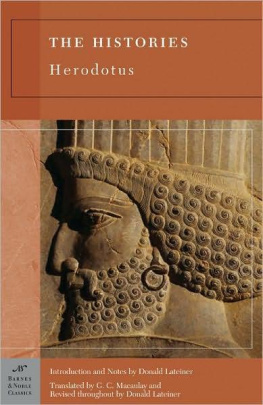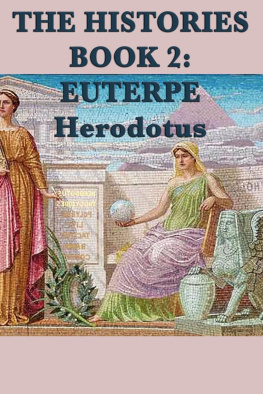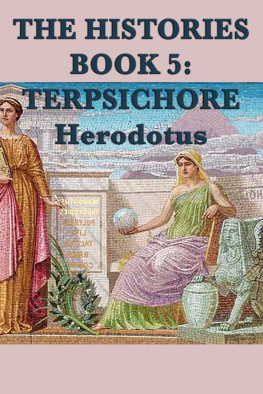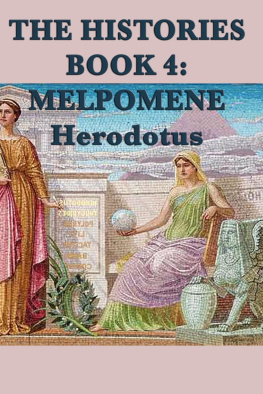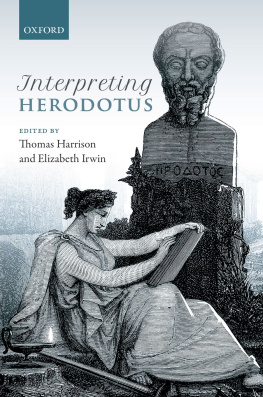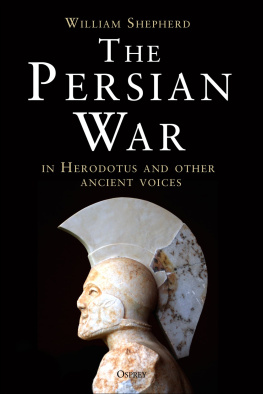The Histories
Book 3: Thaleia
By Herodotus
The Histories Book 3: Thaleia
1. Against this Amasis then Cambyses the son of Cyrus was making his march, taking with him not only other nations of which he was ruler, but also Hellenes, both Ionians and Aiolians: and the cause of the expedition was as follows:Cambyses sent an envoy to Egypt and asked Amasis to give him his daughter; and he made the request by counsel of an Egyptian, who brought this upon Amasis having a quarrel with him for the following reason:at the time when Cyrus sent to Amasis and asked him for a physician of the eyes, whosoever was the best of those in Egypt, Amasis had selected him from all the physicians in Egypt and had torn him away from his wife and children and delivered him up to Persia. Having, I say, this cause of quarrel, the Egyptian urged Cambyses on by his counsel bidding him ask Amasis for his daughter, in order that he might either be grieved if he gave her, or if he refused to give her, might offend Cambyses. So Amasis, who was vexed by the power of the Persians and afraid of it, knew neither how to give nor how to refuse: for he was well assured that Cambyses did not intend to have her as his wife but as a concubine. So making account of the matter thus, he did as follows:there was a daughter of Apries the former king, very tall and comely of form and the only person left of his house, and her name was Nitetis. This girl Amasis adorned with raiment and with gold, and sent her away to Persia as his own daughter: but after a time, when Cambyses saluted her calling her by the name of her father, the girl said to him: O king, thou dost not perceive how thou hast been deceived by Amasis; for he adorned me with ornaments and sent me away giving me to thee as his own daughter, whereas in truth I am the daughter of Apries against whom Amasis rose up with the Egyptians and murdered him, who was his lord and master. These words uttered and this occasion having arisen, led Cambyses the son of Cyrus against Egypt, moved to very great anger.
2. Such is the report made by the Persians; but as for the Egyptians they claim Cambyses as one of themselves, saying that he was born of this very daughter of Apries; for they say that Cyrus was he who sent to Amasis for his daughter, and not Cambyses. In saying this however they say not rightly; nor can they have failed to observe (for the Egyptians fully as well as any other people are acquainted with the laws and customs of the Persians), first that it is not customary among them for a bastard to become king, when there is a son born of a true marriage, and secondly that Cambyses was the son of Cassandane the daughter of Pharnaspes, a man of the Achaimenid family, and not the son of the Egyptian woman: but they pervert the truth of history, claiming to be kindred with the house of Cyrus. Thus it is with these matters;
3, and the following story is also told, which for my part I do not believe, namely that one of the Persian women came in to the wives of Cyrus, and when she saw standing by the side of Cassandane children comely of form and tall, she was loud in her praises of them, expressing great admiration; and Cassandane, who was the wife of Cyrus, spoke as follows: Nevertheless, though I am the mother of such children of these, Cyrus treats me with dishonour and holds in honour her whom he has brought in from Egypt. Thus she spoke, they say, being vexed by Nitetis, and upon that Cambyses the elder of her sons said: For this cause, mother, when I am grown to be a man, I will make that which is above in Egypt to be below, and that which is below above. This he is reported to have said when he was perhaps about ten years old, and the women were astonished by it: and he, they say, kept it ever in mind, and so at last when he had become a man and had obtained the royal power, he made the expedition against Egypt.
4. Another thing also contributed to this expedition, which was as follows:There was among the foreign mercenaries of Amasis a man who was by race of Halicarnassos, and his name was Phanes, one who was both capable in judgment and valiant in that which pertained to war. This Phanes, having (as we may suppose) some quarrel with Amasis, fled away from Egypt in a ship, desiring to come to speech with Cambyses: and as he was of no small repute among the mercenaries and was very closely acquainted with all the affairs of Egypt, Amasis pursued him and considered it a matter of some moment to capture him: and he pursued by sending after him the most trusted of his eunuchs with a trireme, who captured him in Lykia; but having captured him he did not bring him back to Egypt, since Phanes got the better of him by cunning; for he made his guards drunk and escaped to Persia. So when Cambyses had made his resolve to march upon Egypt, and was in difficulty about the march, as to how he should get safely through the waterless region, this man came to him and besides informing of the other matters of Amasis, he instructed him also as to the march, advising him to send to the king of the Arabians and ask that he would give him safety of passage through this region.
5. Now by this way only is there a known entrance to Egypt: for from Phoenicia to the borders of the city of Cadytis belongs to the Syrians who are called of Palestine, and from Cadytis, which is a city I suppose not much less than Sardis, from this city the trading stations on the sea-coast as far as the city of Ienysos belong to the king of Arabia, and then from Ienysos again the country belongs to the Syrians as far as the Serbonian lake, along the side of which Mount Casion extends towards the Sea. After that, from the Serbonian lake, in which the story goes that Typhon is concealed, from this point onwards the land is Egypt. Now the region which lies between the city of Ienysos on the one hand and Mount Casion and the Serbonian lake on the other, which is of no small extent but as much as a three days journey, is grievously destitute of water.
6. And one thing I shall tell of, which few of those who go in ships to Egypt have observed, and it is this:into Egypt from all parts of Hellas and also from Phoenicia are brought twice every year earthenware jars full of wine, and yet it may almost be said that you cannot see there one single empty wine-jar. In what manner, then, it will be asked, are they used up? This also I will tell. The head-man of each place must collect all the earthenware jars from his own town and convey them to Memphis, and those at Memphis must fill them with water and convey them to these same waterless regions of Syria: this the jars which come regularly to Egypt and are emptied there, are carried to Syria to be added to that which has come before.
7. It was the Persians who thus prepared this approach to Egypt, furnishing it with water in the manner which has been said, from the time when they first took possession of Egypt: but at the time of which I speak, seeing that water was not yet provided, Cambyses, in accordance with what he was told by his Halicarnassian guest, sent envoys to the Arabian king and from him asked and obtained the safe passage, having given him pledges of friendship and received them from him in return.
8. Now the Arabians have respect for pledges of friendship as much as those men in all the world who regard them most; and they give them in the following manner:A man different from those who desire to give the pledges to one another, standing in the midst between the two, cuts with a sharp stone the inner parts of the hands, along by the thumbs, of those who are giving the pledges to one another, and then he takes a thread from the cloak of each one and smears with the blood seven stones laid in the midst between them; and as he does this he calls upon Dionysos and Urania. When the man has completed these ceremonies, he who has given the pledges commends to the care of his friends the stranger (or the fellow-tribesman, if he is giving the pledges to one who is a member of his tribe), and the friends think it right that they also should have regard for the pledges given. Of gods they believe in Dionysos and Urania alone: moreover they say that the cutting of their hair is done after the same fashion as that of Dionysos himself; and they cut their hair in a circle round, shaving away the hair of the temples. Now they call Dionysos Orotalt and Urania they call Alilat.

